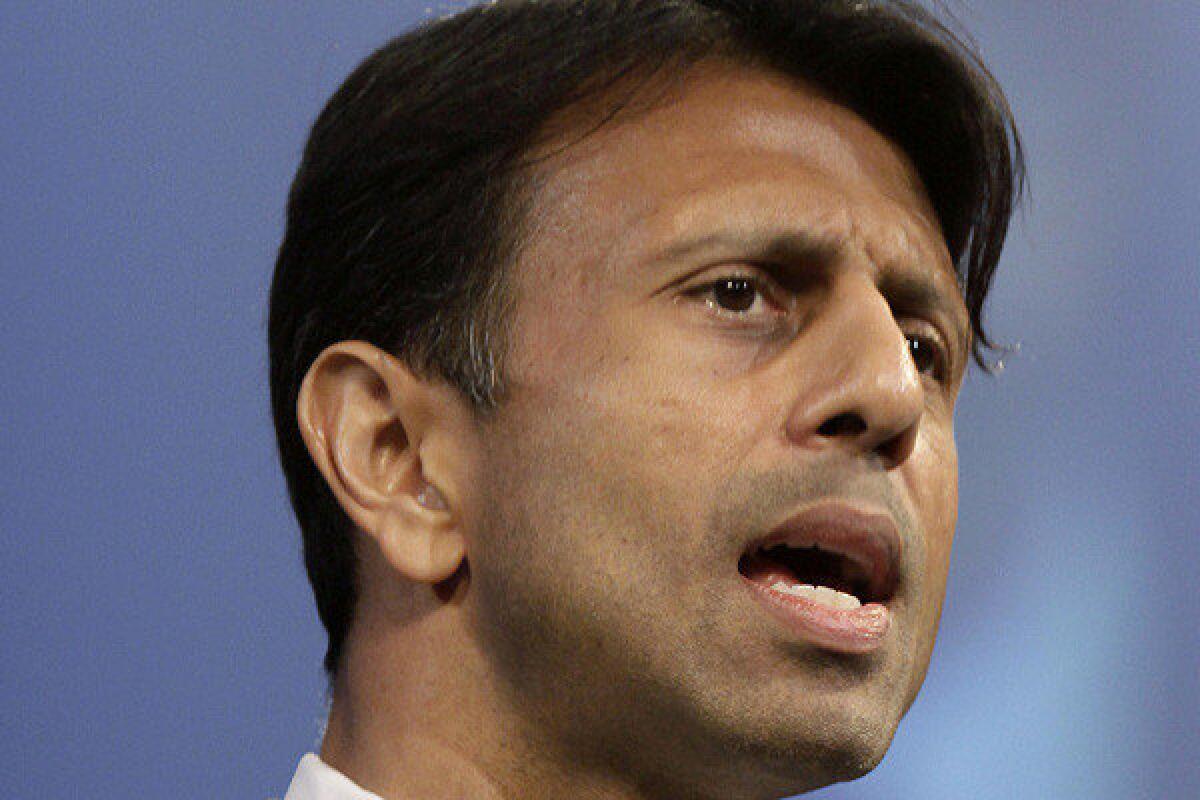At Republican governors’ gathering, plenty of blame for Romney

- Share via
LAS VEGAS — A week’s worth of soul-searching among Republicans has yielded no shortage of explanations for the party’s failure to win the White House. They point to the Obama campaign’s early and aggressive effort to disparage Mitt Romney. They admit Democrats had a superior voter-turnout operation. Some point to Superstorm Sandy, saying it robbed Romney of momentum.
What they won’t say is that President Obama won a mandate for his vision, or that the GOP has veered too far right in its outlook.
“The president won the election. But I think it wasn’t on the issues,” Iowa Gov. Terry Branstad said Thursday at the annual Republican Governors Assn. conference. “He ran a heck of a good grass-roots organization and was able to basically convince enough people that they couldn’t trust Gov. Romney.”
The meeting of Republican governors and governors-elect here, which also attracted party strategists, donors and lobbyists, is the largest gathering of GOP leaders since the election. And few were shy about laying much of the blame squarely at the feet of the former Massachusetts governor, who was once the group’s chairman.
“The fatal flaw with this presidential election, more than anything, wasn’t just the last few weeks. It was early this summer, after an extended and lengthy and onerous primary season, the president’s campaign did an effective job at branding Mitt Romney before he fully had a chance to identify himself to the people of this country,” said Gov. Scott Walker of Wisconsin, who in June defeated a recall effort by Democrats and labor. “We didn’t have a well-defined case against the president and, of even greater importance, we didn’t have an effective means by which to counter the attacks.”
Gov. Bobby Jindal of Louisiana, the group’s incoming chairman, pointedly criticized Romney for continuing to advance the idea, most recently in a Wednesday conference call with donors, that Obama owed his victory to “gifts” his administration had doled out to key demographic groups.
“We have got to stop dividing the American voters. We need to go after 100% of the votes, not 53%,” Jindal said, in a reference to Romney’s videotaped comments from earlier in the year that the 47% of Americans who don’t pay taxes see themselves as victims. “I think that’s absolutely wrong. I don’t think that represents where we are as a party and where we are going as a party.”
Jindal and others offered the GOP’s governors as a model for how the party can succeed “without abandoning our principles.” Although the party lost Senate and House seats, as well as the White House, it won a gubernatorial post in North Carolina, a Democratic seat for 24 years, while also holding onto its other seats.
Walker noted that he won his recall campaign by a larger margin than his 2010 election.
“So for those who look at the presidential election and are somewhat upset, remember that in probably the clearest-choice election in a gubernatorial election, we came out on the right side of things, and it was largely because we defined it in the clearest of terms,” he said.
Democrats point out that they won seven of the 11 gubernatorial races, including three of the hardest-fought ones — in New Hampshire, Montana and Washington. The GOP failed to win a single state that Obama carried, while Democrats also triumphed in Romney states, such as Missouri and West Virginia.
Former Mississippi Gov. Haley Barbour, in typically colorful terms, said the party’s establishment needed “a very serious proctology exam” to find out why its use of technology and its efforts to get out the vote had fallen so short.
Barbour also said the party needed to make a stronger effort to court minority voters and that there was an urgent need for immigration reform. “We can catch up in four years,” he said. “This isn’t rocket science. But it is hard work, and we can’t wait and start in 2016.”
The Republican National Committee is conducting its own self-examination. An initial review notes how close the party came to unseating Obama. A swing of a combined 333,000 votes in four states would have handed Romney the presidency, the document states.
And diverging from the assumption held by Republicans that undecided voters would break in favor of the challenger, it was Obama who held a 5-percentage-point advantage among those who made up their minds in the final few days of the campaign, and a 7-percentage-point edge among those who decided on the final day.
It is that latter statistic, from exit polls, that prompted several here to speculate that Superstorm Sandy blunted Romney’s campaign. Pollster Glen Bolger noted that a swing of just 3 percentage points in some states could have swayed the outcome.
“Any day in a campaign that wasn’t about the economy or jobs was a good day for Obama,” Barbour said. Seated just feet away was Gov. Chris Christie of New Jersey, who was criticized by some for praising Obama’s handling of the storm in its immediate aftermath, just a week shy of the presidential vote.
The next test of the party will come next year in races for governor’s offices in New Jersey and Virginia, both held by Republicans. But in those races a historical quirk may be on their side — since 1989, the party that won the White House has lost the governorship in those off-year states.
More to Read
Get the L.A. Times Politics newsletter
Deeply reported insights into legislation, politics and policy from Sacramento, Washington and beyond. In your inbox twice per week.
You may occasionally receive promotional content from the Los Angeles Times.











